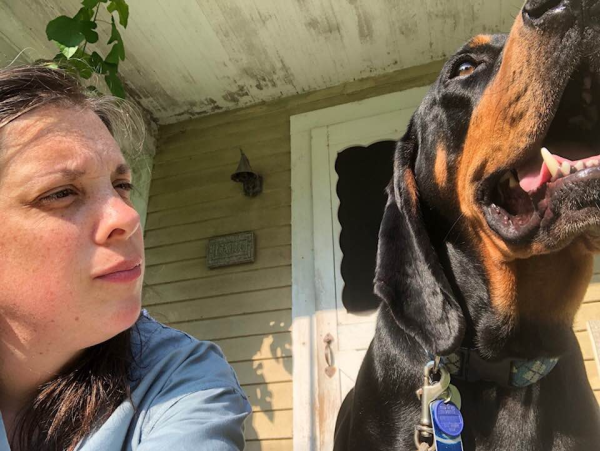-
About
- Leadership & Faculty
- News & Events
-
Admissions
-
Academics
- Graduate
- Advanced Clinical Training
- Continuing Education
- Academic Departments
- Academic Offices
- Simulation Experiences
-
Student Life
- Offices
-
Research
-
- Transformative Research
- Centers & Shared Resources
-
-
Hospitals & Clinics
- Emergency Care
- Hospital Services
-
Community Outreach
- Volunteer
On the Night Watch
Veterinary Technician Heather Manley cares for animals overnight in the Foster Hospital ECC

“I have animals uninterrupted for eight hours,” reveals Heather Manley, overnight veterinary technician in the Emergency Critical Care (ECC) Department at Foster Hospital for Small Animals at Cummings School of Veterinary Medicine.
“During the day it can go from one to 10 very quickly. I prefer the tone of overnights, keeping the animals comfortable, having time to think and look out for my patients. I feel more connected on overnights versus the chaos of the day,” she acknowledges.
Manley earned a B.S. in biology from Western New England College. She began her career working in environmental science at New England Bioassay, testing aquaculture.
She moved on to Angell Animal Medical Center in Springfield, training as a veterinarian technician. During her 12 years at Angell, she also worked in the pharmacy, dispensing medication for patients. After the birth of her first child, Manley switched to overnight shifts as a veterinary technician.
“I really enjoyed Angell, it’s a very civic-minded organization helping the community,” she says. “The people were wonderful.”
Manley joined the staff at Cummings School as a pharmacy technician for the Hospital for Large Animals and Foster Hospital for Small Animals in 2008. She balanced her holiday and weekend hours at Tufts with three days a week at Countryside Animal Hospital in Granby, Massachusetts.
After five years, Manley assumed a full-time position as a veterinary technician at Cummings School, working nights in the wards at Foster Hospital, tending to animals recovering from surgery or illness.
“The work is physical and always different, so it was less regimented than the pharmacy. It was wonderful work,” she reveals.
She transitioned to Emergency Critical Care (ECC) at Foster Hospital in 2019.
“It’s a narrower focus than the wards, the depth of knowledge you need for specific trauma versus extended care,” Manley contends. “It can be tough emotionally.”
She treats mainly dogs, cats, and exotic animals like snakes, birds, chickens, hedgehogs and ferrets (before they head to ZCAM). Her typical cases include animals suffering from cancer, car collisions, broken legs, disc issues, head injuries, and animals that ingested something unhealthy, such as a rubber toy, marijuana, and recently, a dog who ate a pair of underwear.
She describes the start to her shift, “I get to know the patients informally, assist with treatments, and see what the room needs for restocking and cleaning.” She helps staff on the earlier shift until they head home in the late evening, then gathers with the team to review the animals’ histories, issues and treatment plans. “Then they become my patients.”
Once the pandemic started and many veterinary practices closed, the ECC became much busier. As with many industries, veterinary hospitals have struggled with staffing issues due to COVID-19 as well.
“Dean Cribb and [Hospital Director] Dr. Cheryl Blaze have been doing a marvelous job keeping us updated and supported during Covid,” Manley admits. “I don’t see many people overnight, but I see them.”
Most rewarding for Manley are her co-workers at Foster Hospital and those times she says, “when you can see you’ve made a difference to improve the life of an animal who was in a bad state when it arrived.”
Do you have a passion for taking care of pets and the people who love them? Are you looking for a collaborative work environment where you can learn, teach, and grow? Cummings School of Veterinary Medicine is hiring Veterinary Technicians for our Foster Hospital for Small Animals at Tufts University and our Large Animal Hospital. Our team of professionals works hard and smiles more. Join us. Learn more and apply.